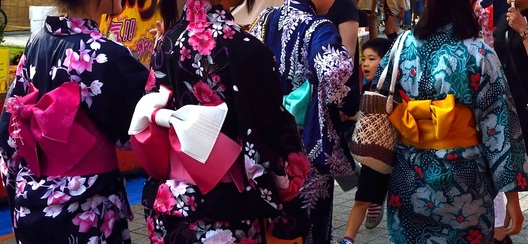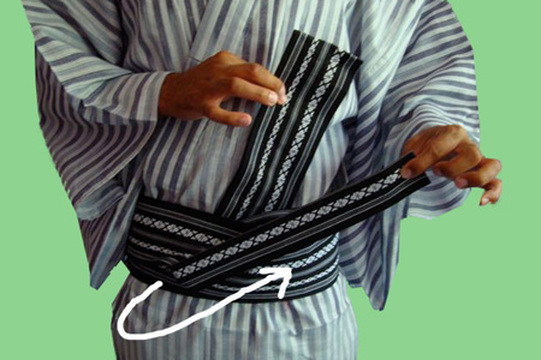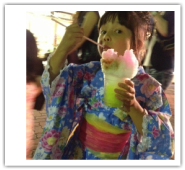|
A long time ago (250 years thereabouts), a powerful dude named Sakakibara Masamune decreed that the people of his castle town slip into something more comfortable and shimmy downtown for a good time. “Do what?” his attendants asked. “Throw a party, you monkeys! I’m outta here!” Indeed he was, off to rule another fiefdom, but not before starting a tradition that would fill the fine streets of Himeji with colourful summer kimono (ゆかた, yukata), octopus dumplings and (a little later) skyrockets and riot police for three days a year, every year thereafter. More than just a celebration of the highly functional yukata, it’s a fashion show! Women’s yukata colours are brighter, patterns livelier, and shock! horror! their hems are rising. The elderly women of the Good Hood shake their heads and click their tongues at these parading young things in short yukata; the young fellas nod their heads and knock themselves out with their tongues. The Yukata Festival, held June 22-24 every year, also celebrates the rainy season. That’s right, it is the WETTEST time of the year (and news just in: rain is forecast for Sunday June 22nd) which doesn’t stop several hundred thousand people from choking the streets and alleys south of Himeji castle with coin to spend on cold beer, toys and tasty treats. Catering to the masses are more than 800 stalls, erected and manned by a small army of itinerant carnivaleers called tekiya. Word on the street is that tekiya are in cohorts with the local yakuza; others say that’s an unfair image and that the stall holders are just abiding by a ‘system’ which takes a nice slice of their earnings and hands it to the mob. Let’s call it a ‘licensing fee’. The City seems OK with this as it ‘stimulates’ the local economy and frees up their rubber stamps for more pressing matters.  Times have changed since I tagged along with some English teachers to my first Yukata Festival 15 years ago. Then, youth gangs flocked from all over the province to wage theatrical (and sometimes violent) running pitched battles with their rivals on the city streets. Hard to believe in peace-loving Japan? Well listen to this: watching riot police get pelted with skyrockets, drag troublemakers off to paddy wagons by their orange hair, and see the odd motor scooter get barbecued, reminded me of the Costa Rican fruit vendor riots of ‘91 (Yes, I was in Costa Rica in 1991). Cheap entertainment for the masses, poor public relations for the police, not exactly a festive family affair. That’s all gone. The police have changed their tune. They now use subterfuge and infiltration tactics, clever stuff like putting dozens of plain clothes officers into the crowds to catch troublemakers on digital camera or video. Maybe this has worked, or maybe the young punks have just gotten older, gotten married and gotten a job, because the Yukata Matsuri IS now a family affair. ‘Smokin Joe’ Matsumoto, the old kitchen gardener who lives on my street in the Good Hood, will be taking his grandchildren again this year. Those long sleeves of his faded yukata will be sure to hold a pack of cigarettes, a lighter and some coins for cotton candy. My old friend Ono-san won’t be going; she thinks it’s too crowded, too noisy, the food tasteless and too expensive. “I’m saving my yukata for the fireworks festivals,” she says. If YOU go, be sure to drop by the Ghost House at the edge of Otemae park; it has been a going concern for years, adept at taking your money and scaring the beejeezuss out of you with the screams of other teenage patrons. They say a good ghosting chills you out during a long, hot Japanese summer. Personally I’d prefer a cold beer...
0 Comments
Leave a Reply. |
This Blog:What is the essence of a traditional Japanese neighbourhood? Writing from my home in Himeji, a castle town in western Honshu, Seaweed Salad Days distills, ferments, presents! Archives
March 2024
Categories
All
|


 RSS Feed
RSS Feed
